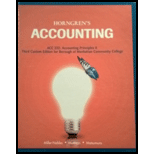
ACCOUNTING PRINCIPLES 222 5/16 >C<
2nd Edition
ISBN: 9781323461525
Author: Horngren
Publisher: PEARSON C
expand_more
expand_more
format_list_bulleted
Question
Chapter 2, Problem 2.1FSC
To determine
The debt ratio for Target Corporation as of January 30, 2016
Debt Ratio:
Debt ratio is the relationship between the Total liabilities and Total Assets of a corporation. Debt ratio shows the part of assets financed by debts. It is calculated by dividing total liabilities by total assets. The formula of debt ratio is as follows:
1. The debt ratio for Target Corporation as of January 30, 2016.
To determine
To identify:
The Comparison of Debt ratios of Target Corporation and Kohli’s Corporation.
2. Comparison of Debt ratios of Target Corporation and Kohli’s Corporation:
Expert Solution & Answer
Want to see the full answer?
Check out a sample textbook solution
Students have asked these similar questions
I need help with accounting
Damell Transport purchased a small delivery vehicle on January 1 at a cost of $26,500. The truck has an
estimated useful life of 5 years and an estimated salvage value of $6,500. Prepare a depreciation schedule
showing the depreciation expense, accumulated depreciation, and book value for each year using the straight-
line depreciation method.
Please explain the accurate process for solving this financial accounting question with proper principles.
Chapter 2 Solutions
ACCOUNTING PRINCIPLES 222 5/16 >C<
Ch. 2 - The detailed record of the changes in a particular...Ch. 2 - Which of the following accounts is a liability?...Ch. 2 - The left side of an account is used to record...Ch. 2 - Which of the following statements is correct?...Ch. 2 - Your business purchased office supplies of $2,500...Ch. 2 - Sedlor Properties puchased office supplies on...Ch. 2 - Posting a $2,500 purchase of office supplies on...Ch. 2 - Pixel Copies recorded a cash collection on account...Ch. 2 - Which sequence correctly summarizes the accounting...Ch. 2 - Nathvile Laundry reported assets of $800 and...
Ch. 2 - Identify the three categones of the accounting...Ch. 2 - What is the purpose of the chart of accounts?...Ch. 2 - What does a ledger show? What’s the difference...Ch. 2 - Accounng uses a double-entry system. Explain what...Ch. 2 - What is T-account? On which side is the debit? On...Ch. 2 - Prob. 6RQCh. 2 - Prob. 7RQCh. 2 - Identify which types of accounts have a normal...Ch. 2 - What are source documents? Provide examples of...Ch. 2 - Prob. 10RQCh. 2 - Explain the five steps in journalizing and posting...Ch. 2 - What are the four parts of a journal entry?Ch. 2 - What is involved in the posting process?Ch. 2 - What is the purpose of the trial balance?Ch. 2 - What is the differnce between the trial balance...Ch. 2 - If total debits equal total credits on the trial...Ch. 2 - What is the calculation for the debt ratio?...Ch. 2 - Identifying accounts Learning Objective 1 Consider...Ch. 2 - Identifying increases and decreases in accounts...Ch. 2 - Identifying normal balances Learning Objective 2...Ch. 2 - i Journalizing transactions Jack Davis opened a...Ch. 2 - Journalizing transactions Arkansas Sales...Ch. 2 - (atculaiing the balance of a r-accounl Ac< ounts P...Ch. 2 - Journalizing transactions and posting io I account...Ch. 2 - Preparing a trial balance Henderson Floor...Ch. 2 - Prob. S2.9SECh. 2 - Using accounting vocabulary Learning Objectives 1,...Ch. 2 - Creating a chart of accounts Learning Objective 1...Ch. 2 - Identifying accounts, increases in accounts, and...Ch. 2 - Identifying increases and decreases in accounts...Ch. 2 - Identifying source documents Learning Objective 3...Ch. 2 - Analyzing and journalizing transactions Learing...Ch. 2 - Prob. E2.16ECh. 2 - Prob. E2.17ECh. 2 - Analyzing and journalizing transactions Learning...Ch. 2 - Posting journal entries to four-column accounts...Ch. 2 - Analyzing transactions from T-accounts Learning...Ch. 2 - Prob. E2.21ECh. 2 - Prob. E2.22ECh. 2 - Prob. E2.23ECh. 2 - Journalizing transactions, posting journal entries...Ch. 2 -
i 25 \nalyzing accounting errors
- lime ii is i...Ch. 2 - Prob. E2.26ECh. 2 - Prob. E2.27ECh. 2 - Prob. E2.28ECh. 2 - Prob. P2.29APGACh. 2 - Prob. P2.30APGACh. 2 - pj-.U A f«ornalizing transactions, posting journal...Ch. 2 - P2 U \ Jornn-d./lng i. KK.U lions, polling journal...Ch. 2 - Prob. P2.33APGACh. 2 - Prob. P2.34APGACh. 2 - P2-351' jf n,»l« *ng transaction’., posting...Ch. 2 - Prob. P2.36BPGBCh. 2 - Prob. P2.37BPGBCh. 2 - Prob. P2.38BPGBCh. 2 - Prob. P2.39BPGBCh. 2 - Prob. P2.40BPGBCh. 2 - Prob. P2.41CPCh. 2 - Prob. P2.42PSCh. 2 - Prob. 2.1DCCh. 2 - Prob. 2.1EICh. 2 - Prob. 2.1FCCh. 2 - Prob. 2.1FSC
Knowledge Booster
Similar questions
- Compute the cost per unit using absorption costingarrow_forwardPlease provide the solution to this financial accounting question using proper accounting principles.arrow_forwardTo avoid any problems of inflation or unemployment, the government should have a budget deficit or surplus of:arrow_forward
arrow_back_ios
SEE MORE QUESTIONS
arrow_forward_ios
Recommended textbooks for you

 AccountingAccountingISBN:9781337272094Author:WARREN, Carl S., Reeve, James M., Duchac, Jonathan E.Publisher:Cengage Learning,
AccountingAccountingISBN:9781337272094Author:WARREN, Carl S., Reeve, James M., Duchac, Jonathan E.Publisher:Cengage Learning, Accounting Information SystemsAccountingISBN:9781337619202Author:Hall, James A.Publisher:Cengage Learning,
Accounting Information SystemsAccountingISBN:9781337619202Author:Hall, James A.Publisher:Cengage Learning, Horngren's Cost Accounting: A Managerial Emphasis...AccountingISBN:9780134475585Author:Srikant M. Datar, Madhav V. RajanPublisher:PEARSON
Horngren's Cost Accounting: A Managerial Emphasis...AccountingISBN:9780134475585Author:Srikant M. Datar, Madhav V. RajanPublisher:PEARSON Intermediate AccountingAccountingISBN:9781259722660Author:J. David Spiceland, Mark W. Nelson, Wayne M ThomasPublisher:McGraw-Hill Education
Intermediate AccountingAccountingISBN:9781259722660Author:J. David Spiceland, Mark W. Nelson, Wayne M ThomasPublisher:McGraw-Hill Education Financial and Managerial AccountingAccountingISBN:9781259726705Author:John J Wild, Ken W. Shaw, Barbara Chiappetta Fundamental Accounting PrinciplesPublisher:McGraw-Hill Education
Financial and Managerial AccountingAccountingISBN:9781259726705Author:John J Wild, Ken W. Shaw, Barbara Chiappetta Fundamental Accounting PrinciplesPublisher:McGraw-Hill Education


Accounting
Accounting
ISBN:9781337272094
Author:WARREN, Carl S., Reeve, James M., Duchac, Jonathan E.
Publisher:Cengage Learning,

Accounting Information Systems
Accounting
ISBN:9781337619202
Author:Hall, James A.
Publisher:Cengage Learning,

Horngren's Cost Accounting: A Managerial Emphasis...
Accounting
ISBN:9780134475585
Author:Srikant M. Datar, Madhav V. Rajan
Publisher:PEARSON

Intermediate Accounting
Accounting
ISBN:9781259722660
Author:J. David Spiceland, Mark W. Nelson, Wayne M Thomas
Publisher:McGraw-Hill Education

Financial and Managerial Accounting
Accounting
ISBN:9781259726705
Author:John J Wild, Ken W. Shaw, Barbara Chiappetta Fundamental Accounting Principles
Publisher:McGraw-Hill Education